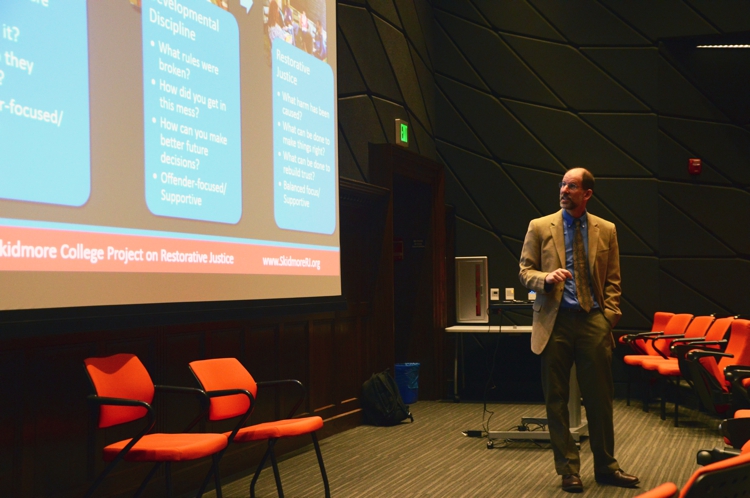David R. Karp, professor of sociology and director of the Project on Restorative Justice at Skidmore College, came to Occidental as the second speaker in the Exploring Restorative Justice Speaker Series March 15 in Choi Auditorium. Karp’s 2:30 p.m. talk, “Restorative Justice on College and University Campuses,” introduced how restorative justice can be used to improve equity on college campuses. He defined restorative justice as a philosophical approach that embraces the reparation of harm, healing of trauma, reconciliation of interpersonal conflict, reduction of social inequality and reintegration of marginalized people.
The Exploring Restorative Justice Speaker Series, sponsored by the Remsen Bird Fund and the Diversity and Equity Board (DEB), began Jan. 25 with David Hooker, professor of practice of conflict transformation and peacebuilding at the Kroc Institute for International Peace Studies of the University of Notre Dame.
Politics professor and restorative justice scholar Thalia González gave a talk to the Senior Leadership team and Faculty Council January 2015 that inspired the restorative justice speaker series at Occidental, according to Chief of Administrative Affairs Marsha Schnirring. González’s talk garnered intrigue among administration and faculty, encouraging them to learn more about how restorative justice is practiced on college campuses.
“[Restorative justice is] about developing people’s capacity to speak about difficult things with others and not run away, and as we know, most of us are conflict averse who prefer to text our way through conflict than sit face-to-face,” Karp said.
Karp stressed the value of two parts of restorative justice: conferencing and circles within the process and improving interpersonal relations through mediating talks between the victim and offender, both originating from indigenous Maori culture.
Schnirring views Occidental as a place where restorative justice can flourish. She sees students using restorative justice across campus, including organizations, residential halls and the Center for Community Based Learning (CCBL), which aims to enrich students’ learning and commitment to social responsibility.
Haarika Reddy (senior) completed her senior comprehensive project this year on restorative justice on college campuses. While the bulk of attendees at the talk were administration and faculty, Reddy believes students are at the center of campus restorative justice.
“Restorative justice, if implemented at Occidental, is something that will impact the students the most,” Reddy said via email. “Therefore, it is of the utmost importance that we become educated about restorative justice so that we can push the school to implement restorative justice in ways that transform the campus.”
Project SAFE Manager and Survivor Advocate Marianne Frapwell also attended the discussion. She came to the talk because she had heard Karp speak last year on how restorative justice can be used in cases of sexual violence and in prevention measures.
“I think there are so many survivors who are asking for things like this, asking for things that traditional disciplinary processes can’t provide,” Frapwell said.
Reddy hopes the accountability restorative justice can provide will be beneficial to administrative and institutional accountability in addition to students’ accountability.
“[Restorative justice on college campuses] is very focused on student accountability by offering students an opportunity to redress harm they have caused,” Reddy said via email. “[But] what about [administrative accountability]? Occidental has a large role in that too.”
Have a tip? Email us at weekly@oxy.edu or tweet us @OxyWeekly.
![]()































